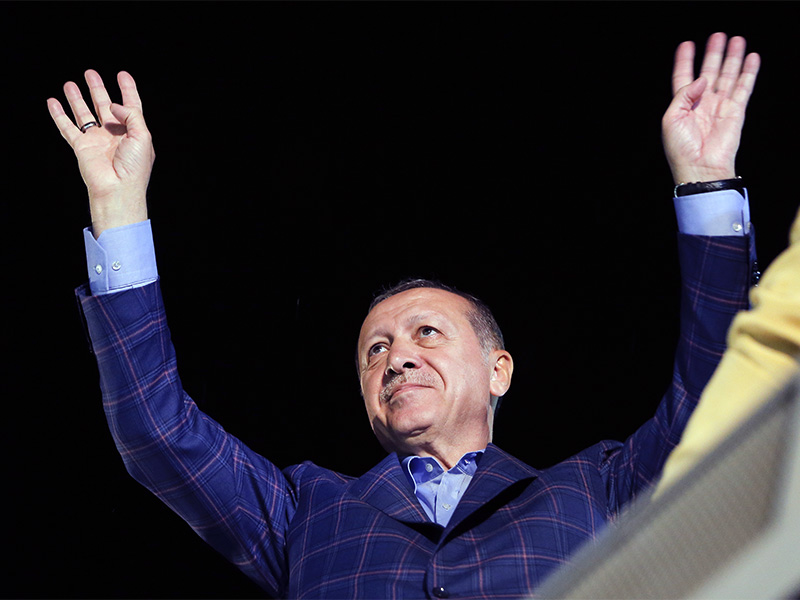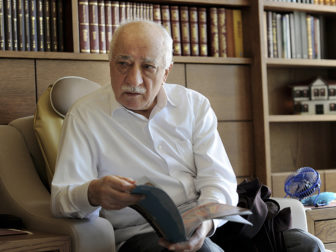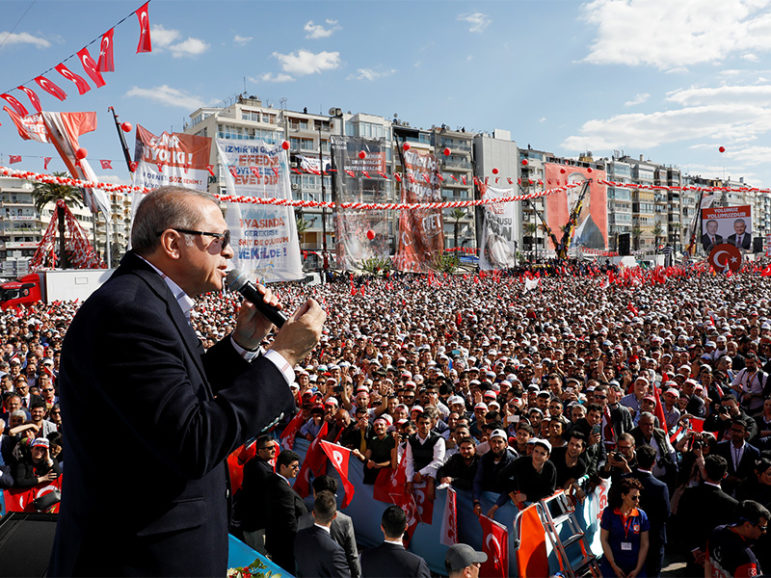PARIS (RNS) Turkish President Recep Tayyip Erdogan’s drive for near absolute power — which last weekend’s controversial referendum advanced — may have been aided by a hapless spy operation involving Turkey’s broad network of mosques in Europe.
Lawmakers, including those with Turkish roots, are calling for tighter restrictions on the mosques — there are at least 900 of them in Germany — which critics say keep diaspora Turks from fully integrating.
“We have to ask what we can do to finally cut the umbilical cord between these Erdogan mosques and Turkey,” said Cem Ozdemir, a German-born Turk who is a national co-leader of the opposition Greens party.
[ad number=“1”]
“How can we ensure that an Islam develops that respects the German Constitution and does not depend on Mr. Erdogan? There is still a lot to discuss here.”
While campaigning in Turkey for the referendum, the Turkish leader angrily accused Germany and the Netherlands of “Nazi methods” when they banned Turkish officials from addressing ethnic Turks in those countries.
Behind the scenes, Ankara also tapped its extensive network of state-financed mosques and pro-government Turks in Europe to get out a “yes” vote among the Turks casting absentee ballots. They also identified Erdogan critics opposed to the president’s quest for sweeping new powers.

Turkish President Tayyip Erdogan greets his supporters in Istanbul, Turkey, on April 16, 2017. Photo courtesy of Reuters/Murad Sezer
The effort paid off. While Erdogan’s reform won only 51.4 percent support from voters in Turkey itself, it won 63 percent in Germany, 71 percent in the Netherlands and 73 percent in Austria. Their votes may have assured Erdogan his tight margin of victory.
In Germany, questions were raised about how Turks could live in freedom there and vote for one-man rule in the old country.
“German politicians have to say stop this import of imams, we can take care of that ourselves,” said Muhterem Aras, speaker of the Baden-Wuerttemberg state assembly in Stuttgart, who immigrated to Germany as a child.
[ad number=“2”]
The pressure is now on DITIB, the association of Turkish mosques in Germany that is closely linked to Turkey’s state religious authority, Diyanet.
DITIB’s imams are Diyanet employees who come from Turkey for a few years, often speaking little or no German, and its chairman is the religious attache of the Turkish Embassy in Berlin.
The Cologne-based association has long been accused of hampering integration by preaching conservative Islam and Turkish patriotism. But it was generally accepted as a mainly religious organization and leading spokesman for the Muslim minority.
That changed after the failed military coup in July of last year, when Ankara tapped it to help support Erdogan and inform on his critics in Germany.
Erdogan accused his archenemy Fethullah Gulen — an Islamic preacher who founded a worldwide charity network and has lived in exile in Pennsylvania since 1999 — of masterminding the attempted putsch and began an extensive purge of Gulen supporters in response.

Islamic preacher Fethullah Gulen at his residence in Saylorsburg, Pa., on Sept. 26, 2013. Photo courtesy of Selahattin Sevi/Zaman Daily via Cihan News Agency/Handout via Reuters
The details of last year’s coup attempt are disputed, and Gulen has denied any role in it.
But last September, a confidential letter from Diyanet’s foreign department instructed imams in 38 countries to provide information on local Gulen supporters and their activities.
DITIB officials initially denied media reports about the letter but later admitted to its existence and said it had been “a mistake.” They stressed that their imams were Diyanet employees and said some had spied on Gulenists without DITIB’s knowledge.
Around that time, Germany’s most populous state, North Rhine-Westphalia, asked over 100 DITIB imams serving as prison chaplains to submit to a security check. All but a dozen of them refused and were promptly barred from state penitentiaries.
In February, the head of Turkey’s MIT intelligence service gave his counterpart from Germany’s BND spy agency a list of 358 German Turks and about 200 associations, schools and other groups he said supported Gulen.
[ad number=“3”]
The list, presumably drawn up with information from imams and others, included addresses and telephone numbers. Some even had photographs apparently taken by hidden cameras.
The Turkish spy chief apparently thought the Germans would help Ankara keep tabs on these dissidents, but the BND head promptly alerted German authorities and many of those on the list. Among them was a parliamentary deputy and a Berlin city politician said to have close ties to the Gulen movement.
The German government revealed in April that it was investigating 20 suspected Turkish spies, 13 of them DITIB imams. Austrian and Swiss authorities have also launched investigations into alleged espionage there.
Austrian parliamentary deputy Peter Pilz released documents in April that he said showed Ankara got information on Gulen supporters from 30 embassies in Europe, Africa, Asia and Australia.

The Central Mosque in Cologne, Germany, pictured in April 2015, is run by DITIB. Photo courtesy of Creative Commons/Raimond Spekking
He has called on the Vienna government, which banned Diyanet payments to its imams in Austria two years ago, to dissolve the local Turkish mosque association ATIB.
The Diyanet representative in the Netherlands abruptly returned home in December when media there reported on the letter. A Belgian province suspended some subsidies to mosques there after the letter was reported.
The German government has already begun to limit its cooperation with DITIB, freezing about a million euros in funds meant to finance three projects it planned together with Berlin’s family ministry.
Interior Minister Thomas de Maiziere has urged DITIB to take concrete steps “to make the autonomy and independence of its national and state organizations more transparent.”
The association has been an important partner on state advisory boards overseeing Islamic religion courses in public schools.
Since the spy scandal, however, its participation has been suspended in North Rhine-Westphalia and two other states are considering ending their cooperation with it as well.
“For a long time, DITIB was a beam of hope and a model for other Muslim associations,” the influential Frankfurter Allgemeine Zeitung newspaper wrote in an editorial.
“If DITIB imams behave as instruments of (Turkish) domestic political struggles, that is not just a misunderstanding. This is an organized threat to basic rights that legally disqualifies it as a partner.”
(Tom Heneghan is a correspondent based in Paris)





